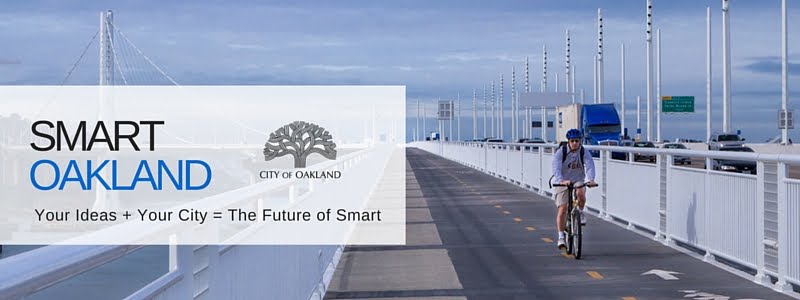Dear Prof. Chetty,
On behalf of Smart Oakland, I’m writing you today as you may be in the best position to help Mayor Schaaf and the City of Oakland better understand what I will call the "Public Economics of Smart Cities (SC) and the Internet of Things (IoT)".
According to the US Dept. of Transportation's "Smart City Challenge" notice of funding opportunity, Section 6. of our Vision Narrative needs to "identify and rate key technical, policy, and institutional risks associated with the deployment vision and discuss plans for mitigating those risks."
Oakland and other mid-size American cities need to have a better understanding of the liability and financial risks associated SCIoT. At the very least, we need to be able to respond to concerns like the ones raised in a recent SFChronicle article entitled, “Self-driving cars to drain millions from city, state coffers”.
Beyond this, there is a good chance that Oakland's proposal will include elements that force the issue of who owns the data being generated by SCIoT. And along with that question of ownership comes the issue of rights and responsibilities.
The notice of funding asks cities to address the risks. However, we can’t afford to ignore the tremendous value that stands to be generated from the SCIoT revolution. This matter is addressed in the notice under "Vision Element #6":
"Urban analytics create value from the data that is collected from connected vehicles, connected citizens, and sensors throughout a city or available from the Internet using information generated by private companies. Analytics that utilize data from across various systems in a city have tremendous potential to identify new insights and unique solutions for delivering services, thereby improving outcomes."
What kind of "value" are we talking about?
In an interview that Boston University Prof. Marshall Van Alstyne did about eighteen months ago on the subject of “platform economics,” he was asked: “What are some of the next areas for platforms?” Existing platforms include some of the most successful companies in the world including Google, Apple, and Uber. In response, Marshall said: “It’s where you see connectivity is coming in. Cities, health care, education, electricity grids.”
With these thoughts in mind, I believe we need a better understanding of how existing local, state and federal policies are shaping this "connectivity" and the ways that this will generate value and how that value will be tapped and extracted. I am concerned that existing policies (like Prop. 26) put California cities in an unreasonably weak position.
Any light you can shed on this matter would be greatly appreciated. Are my concerns are justified? What should cities like Oakland know and understand and what can they start to do now in order to support the development of cities-as-platforms that benefit everyone and not only a small number of private corporations? What does the latest science in Public Economics have to say about the potential winners and losers in a world of cities-as-platforms?
Thank you so much for your time and consideration. We look forward to a response at your earliest possible convenience (as Smart City Challenge proposals are due February 4th!
Sincerely,
Michael
Smart Oakland
Project Manager
Thank you so much for your time and consideration. We look forward to a response at your earliest possible convenience (as Smart City Challenge proposals are due February 4th!
Sincerely,
Michael
Smart Oakland
Project Manager

Posted on behalf of Prof. Marshall Van Alstyne: "Thanks for a useful and insightful letter. The issue of who benefits from the data should never be separated from who creates the data. Privacy, wealth, and smarter cities will all improve with a better balance."
ReplyDeleteSmart Oakland is hosting a proposal writing hackathon tomorrow at 250 FOP, so I was searching for examples and came across this post on CTSP's blog at UC Berkeley: https://ctsp.berkeley.edu/ctsphackathon-success
ReplyDeleteI'm thinking that CTSP's a great fit for Smart Oakland--reaching out to them this morning!
This comment has been removed by the author.
ReplyDeleteLooking for folks working in this space, not only in academia but among community groups and associations, I came across this article by John M. Eger in the Huffington Post:
ReplyDeletehttp://www.huffingtonpost.com/john-m-eger/smart-cities-its-more-tha_b_7006764.html
Clearly, John has been working in this space for some time and Smart Oakland could learn a lot from him!